Analyzing Corporate Governance and Ethics in the Mainzeal Court Case
VerifiedAdded on 2023/05/29
|7
|1422
|239
Case Study
AI Summary
This case study examines the corporate governance failures that led to the collapse of Mainzeal Construction (NZ), focusing on the duties and responsibilities of the directors. The Mainzeal case arose from the failure of the company’s directors to put in place regulatory or compliance measures to stop the governance failure. The liquidators claimed that the directors breached their duties by failing to halt trading and place the company into liquidation in 2011, which resulted in substantial losses to creditors. The case highlights the directors' failure to implement control measures, their over-reliance on the parent company (Richina Pacific), and their neglect of warning signs regarding the company's financial health. The court case ultimately underscores the importance of directors fulfilling their roles in ensuring good corporate governance and ethical practices to prevent organizational collapse. Desklib offers similar case studies and solved assignments for students.
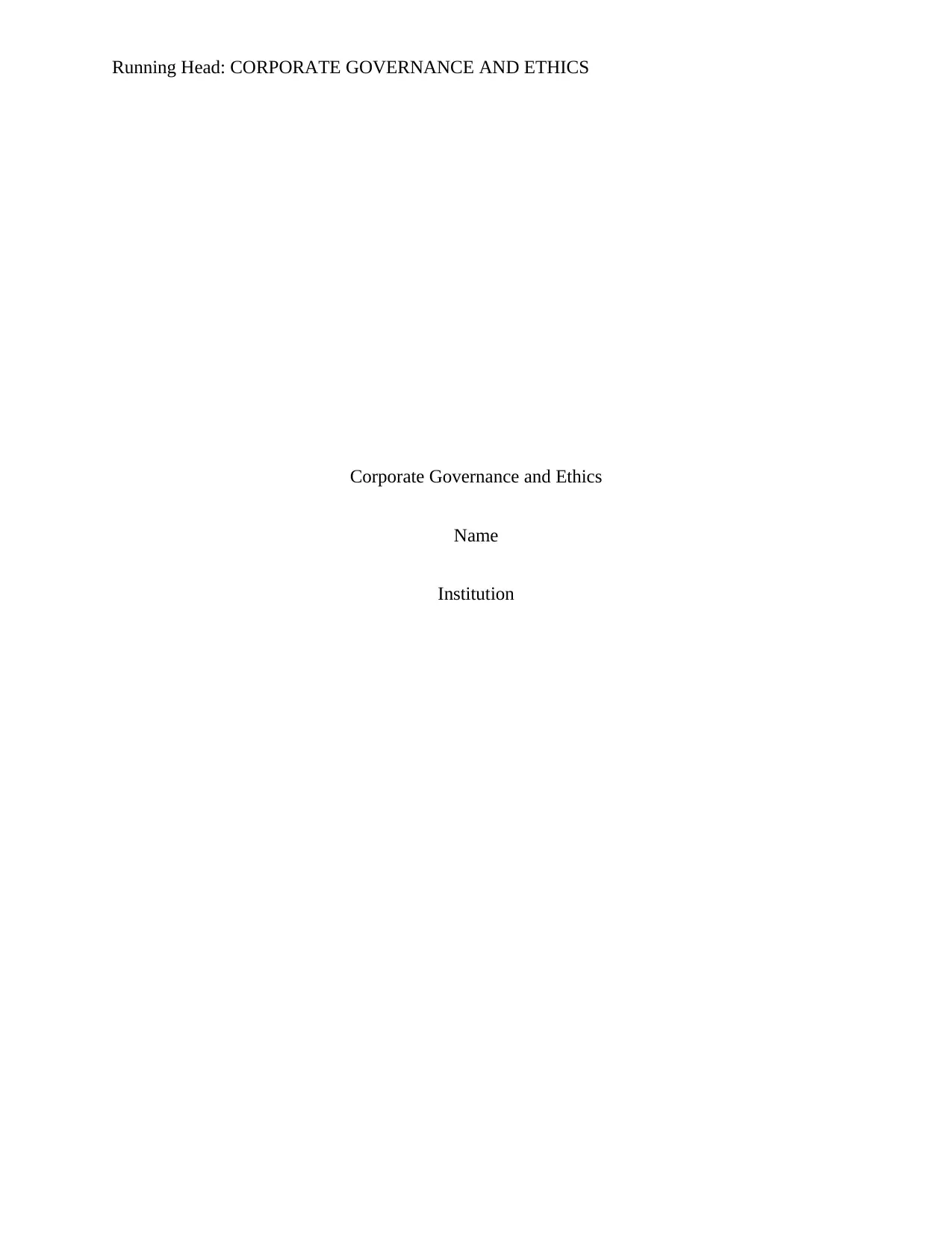
Running Head: CORPORATE GOVERNANCE AND ETHICS
Corporate Governance and Ethics
Name
Institution
Corporate Governance and Ethics
Name
Institution
Paraphrase This Document
Need a fresh take? Get an instant paraphrase of this document with our AI Paraphraser
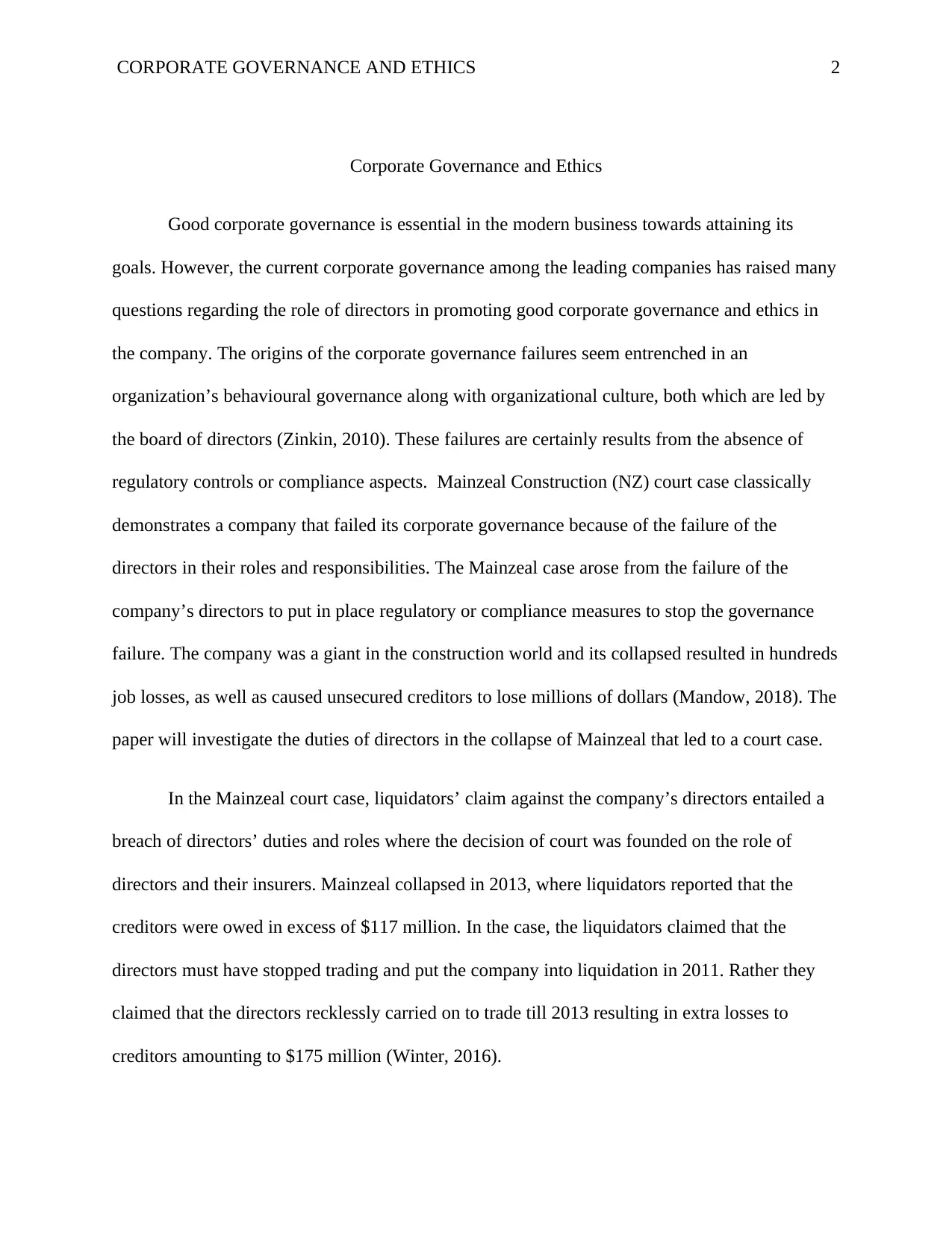
CORPORATE GOVERNANCE AND ETHICS 2
Corporate Governance and Ethics
Good corporate governance is essential in the modern business towards attaining its
goals. However, the current corporate governance among the leading companies has raised many
questions regarding the role of directors in promoting good corporate governance and ethics in
the company. The origins of the corporate governance failures seem entrenched in an
organization’s behavioural governance along with organizational culture, both which are led by
the board of directors (Zinkin, 2010). These failures are certainly results from the absence of
regulatory controls or compliance aspects. Mainzeal Construction (NZ) court case classically
demonstrates a company that failed its corporate governance because of the failure of the
directors in their roles and responsibilities. The Mainzeal case arose from the failure of the
company’s directors to put in place regulatory or compliance measures to stop the governance
failure. The company was a giant in the construction world and its collapsed resulted in hundreds
job losses, as well as caused unsecured creditors to lose millions of dollars (Mandow, 2018). The
paper will investigate the duties of directors in the collapse of Mainzeal that led to a court case.
In the Mainzeal court case, liquidators’ claim against the company’s directors entailed a
breach of directors’ duties and roles where the decision of court was founded on the role of
directors and their insurers. Mainzeal collapsed in 2013, where liquidators reported that the
creditors were owed in excess of $117 million. In the case, the liquidators claimed that the
directors must have stopped trading and put the company into liquidation in 2011. Rather they
claimed that the directors recklessly carried on to trade till 2013 resulting in extra losses to
creditors amounting to $175 million (Winter, 2016).
Corporate Governance and Ethics
Good corporate governance is essential in the modern business towards attaining its
goals. However, the current corporate governance among the leading companies has raised many
questions regarding the role of directors in promoting good corporate governance and ethics in
the company. The origins of the corporate governance failures seem entrenched in an
organization’s behavioural governance along with organizational culture, both which are led by
the board of directors (Zinkin, 2010). These failures are certainly results from the absence of
regulatory controls or compliance aspects. Mainzeal Construction (NZ) court case classically
demonstrates a company that failed its corporate governance because of the failure of the
directors in their roles and responsibilities. The Mainzeal case arose from the failure of the
company’s directors to put in place regulatory or compliance measures to stop the governance
failure. The company was a giant in the construction world and its collapsed resulted in hundreds
job losses, as well as caused unsecured creditors to lose millions of dollars (Mandow, 2018). The
paper will investigate the duties of directors in the collapse of Mainzeal that led to a court case.
In the Mainzeal court case, liquidators’ claim against the company’s directors entailed a
breach of directors’ duties and roles where the decision of court was founded on the role of
directors and their insurers. Mainzeal collapsed in 2013, where liquidators reported that the
creditors were owed in excess of $117 million. In the case, the liquidators claimed that the
directors must have stopped trading and put the company into liquidation in 2011. Rather they
claimed that the directors recklessly carried on to trade till 2013 resulting in extra losses to
creditors amounting to $175 million (Winter, 2016).
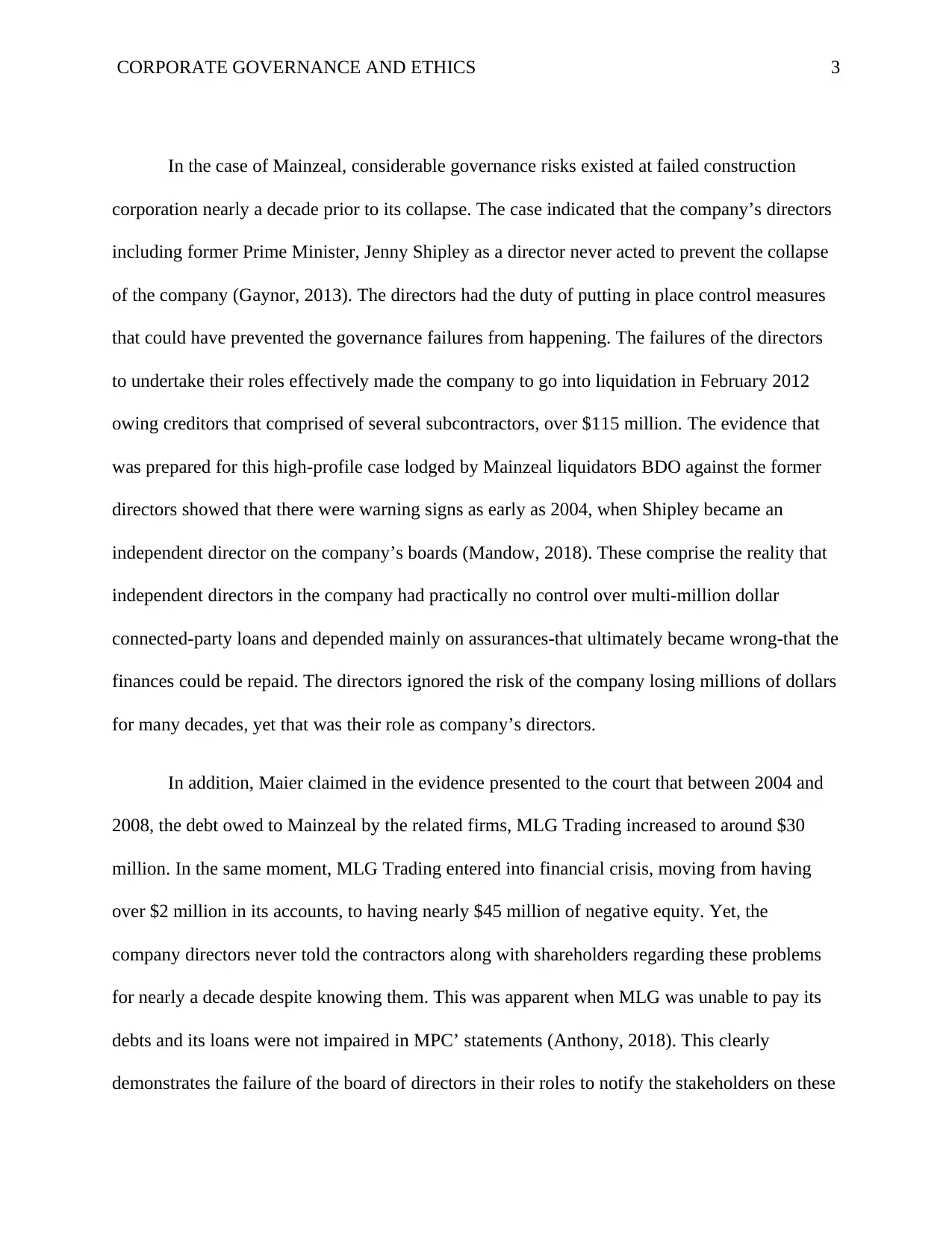
CORPORATE GOVERNANCE AND ETHICS 3
In the case of Mainzeal, considerable governance risks existed at failed construction
corporation nearly a decade prior to its collapse. The case indicated that the company’s directors
including former Prime Minister, Jenny Shipley as a director never acted to prevent the collapse
of the company (Gaynor, 2013). The directors had the duty of putting in place control measures
that could have prevented the governance failures from happening. The failures of the directors
to undertake their roles effectively made the company to go into liquidation in February 2012
owing creditors that comprised of several subcontractors, over $115 million. The evidence that
was prepared for this high-profile case lodged by Mainzeal liquidators BDO against the former
directors showed that there were warning signs as early as 2004, when Shipley became an
independent director on the company’s boards (Mandow, 2018). These comprise the reality that
independent directors in the company had practically no control over multi-million dollar
connected-party loans and depended mainly on assurances-that ultimately became wrong-that the
finances could be repaid. The directors ignored the risk of the company losing millions of dollars
for many decades, yet that was their role as company’s directors.
In addition, Maier claimed in the evidence presented to the court that between 2004 and
2008, the debt owed to Mainzeal by the related firms, MLG Trading increased to around $30
million. In the same moment, MLG Trading entered into financial crisis, moving from having
over $2 million in its accounts, to having nearly $45 million of negative equity. Yet, the
company directors never told the contractors along with shareholders regarding these problems
for nearly a decade despite knowing them. This was apparent when MLG was unable to pay its
debts and its loans were not impaired in MPC’ statements (Anthony, 2018). This clearly
demonstrates the failure of the board of directors in their roles to notify the stakeholders on these
In the case of Mainzeal, considerable governance risks existed at failed construction
corporation nearly a decade prior to its collapse. The case indicated that the company’s directors
including former Prime Minister, Jenny Shipley as a director never acted to prevent the collapse
of the company (Gaynor, 2013). The directors had the duty of putting in place control measures
that could have prevented the governance failures from happening. The failures of the directors
to undertake their roles effectively made the company to go into liquidation in February 2012
owing creditors that comprised of several subcontractors, over $115 million. The evidence that
was prepared for this high-profile case lodged by Mainzeal liquidators BDO against the former
directors showed that there were warning signs as early as 2004, when Shipley became an
independent director on the company’s boards (Mandow, 2018). These comprise the reality that
independent directors in the company had practically no control over multi-million dollar
connected-party loans and depended mainly on assurances-that ultimately became wrong-that the
finances could be repaid. The directors ignored the risk of the company losing millions of dollars
for many decades, yet that was their role as company’s directors.
In addition, Maier claimed in the evidence presented to the court that between 2004 and
2008, the debt owed to Mainzeal by the related firms, MLG Trading increased to around $30
million. In the same moment, MLG Trading entered into financial crisis, moving from having
over $2 million in its accounts, to having nearly $45 million of negative equity. Yet, the
company directors never told the contractors along with shareholders regarding these problems
for nearly a decade despite knowing them. This was apparent when MLG was unable to pay its
debts and its loans were not impaired in MPC’ statements (Anthony, 2018). This clearly
demonstrates the failure of the board of directors in their roles to notify the stakeholders on these
⊘ This is a preview!⊘
Do you want full access?
Subscribe today to unlock all pages.

Trusted by 1+ million students worldwide
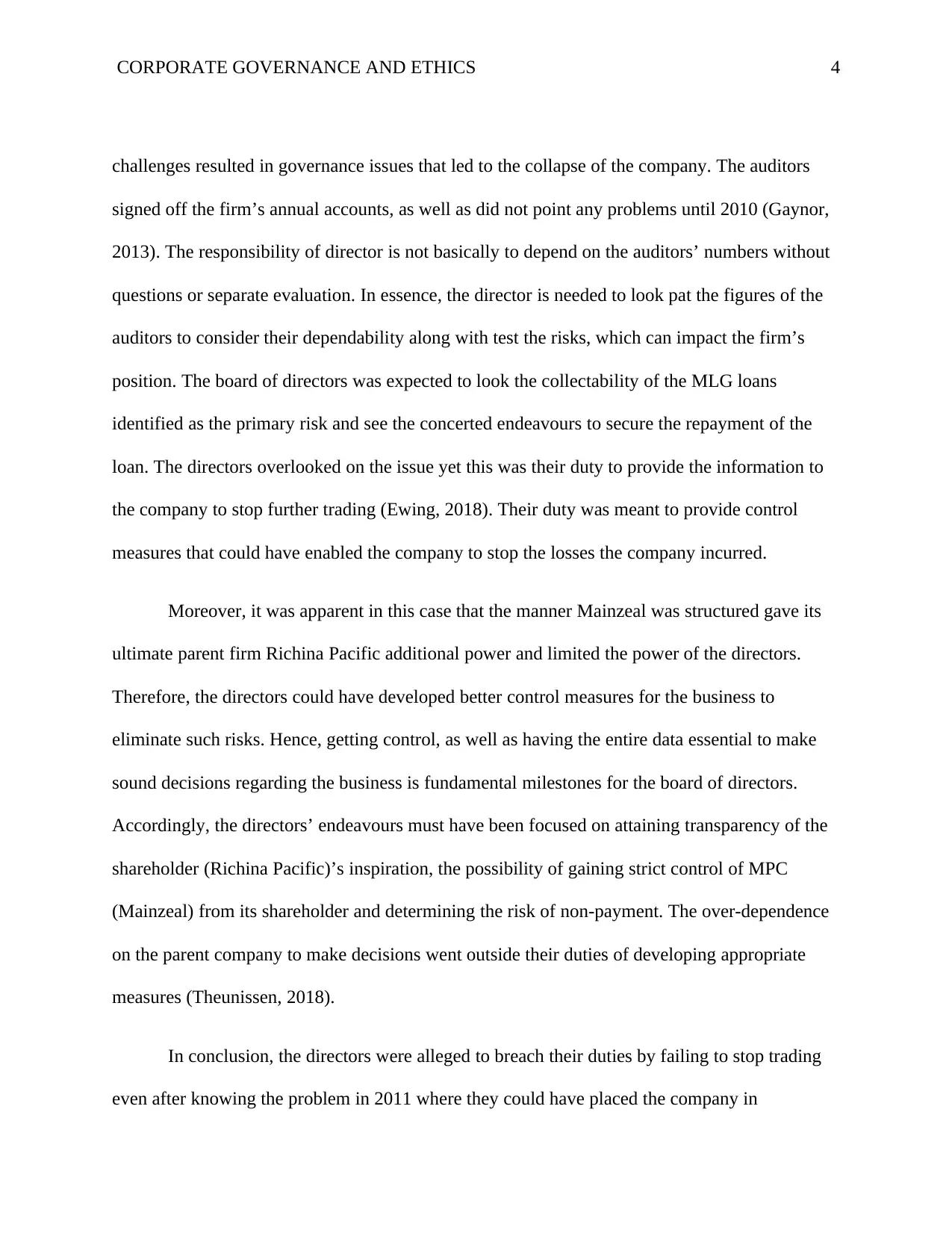
CORPORATE GOVERNANCE AND ETHICS 4
challenges resulted in governance issues that led to the collapse of the company. The auditors
signed off the firm’s annual accounts, as well as did not point any problems until 2010 (Gaynor,
2013). The responsibility of director is not basically to depend on the auditors’ numbers without
questions or separate evaluation. In essence, the director is needed to look pat the figures of the
auditors to consider their dependability along with test the risks, which can impact the firm’s
position. The board of directors was expected to look the collectability of the MLG loans
identified as the primary risk and see the concerted endeavours to secure the repayment of the
loan. The directors overlooked on the issue yet this was their duty to provide the information to
the company to stop further trading (Ewing, 2018). Their duty was meant to provide control
measures that could have enabled the company to stop the losses the company incurred.
Moreover, it was apparent in this case that the manner Mainzeal was structured gave its
ultimate parent firm Richina Pacific additional power and limited the power of the directors.
Therefore, the directors could have developed better control measures for the business to
eliminate such risks. Hence, getting control, as well as having the entire data essential to make
sound decisions regarding the business is fundamental milestones for the board of directors.
Accordingly, the directors’ endeavours must have been focused on attaining transparency of the
shareholder (Richina Pacific)’s inspiration, the possibility of gaining strict control of MPC
(Mainzeal) from its shareholder and determining the risk of non-payment. The over-dependence
on the parent company to make decisions went outside their duties of developing appropriate
measures (Theunissen, 2018).
In conclusion, the directors were alleged to breach their duties by failing to stop trading
even after knowing the problem in 2011 where they could have placed the company in
challenges resulted in governance issues that led to the collapse of the company. The auditors
signed off the firm’s annual accounts, as well as did not point any problems until 2010 (Gaynor,
2013). The responsibility of director is not basically to depend on the auditors’ numbers without
questions or separate evaluation. In essence, the director is needed to look pat the figures of the
auditors to consider their dependability along with test the risks, which can impact the firm’s
position. The board of directors was expected to look the collectability of the MLG loans
identified as the primary risk and see the concerted endeavours to secure the repayment of the
loan. The directors overlooked on the issue yet this was their duty to provide the information to
the company to stop further trading (Ewing, 2018). Their duty was meant to provide control
measures that could have enabled the company to stop the losses the company incurred.
Moreover, it was apparent in this case that the manner Mainzeal was structured gave its
ultimate parent firm Richina Pacific additional power and limited the power of the directors.
Therefore, the directors could have developed better control measures for the business to
eliminate such risks. Hence, getting control, as well as having the entire data essential to make
sound decisions regarding the business is fundamental milestones for the board of directors.
Accordingly, the directors’ endeavours must have been focused on attaining transparency of the
shareholder (Richina Pacific)’s inspiration, the possibility of gaining strict control of MPC
(Mainzeal) from its shareholder and determining the risk of non-payment. The over-dependence
on the parent company to make decisions went outside their duties of developing appropriate
measures (Theunissen, 2018).
In conclusion, the directors were alleged to breach their duties by failing to stop trading
even after knowing the problem in 2011 where they could have placed the company in
Paraphrase This Document
Need a fresh take? Get an instant paraphrase of this document with our AI Paraphraser
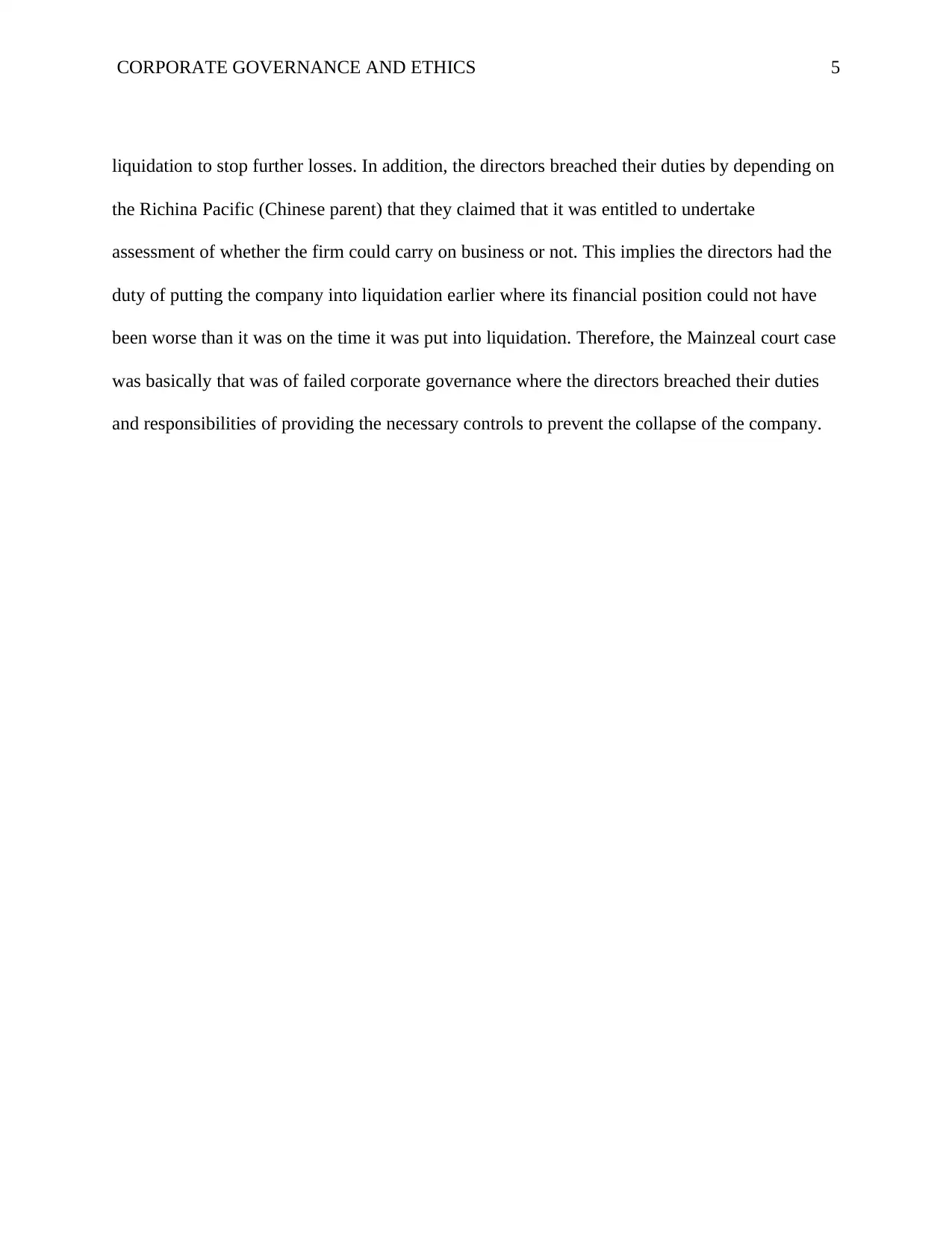
CORPORATE GOVERNANCE AND ETHICS 5
liquidation to stop further losses. In addition, the directors breached their duties by depending on
the Richina Pacific (Chinese parent) that they claimed that it was entitled to undertake
assessment of whether the firm could carry on business or not. This implies the directors had the
duty of putting the company into liquidation earlier where its financial position could not have
been worse than it was on the time it was put into liquidation. Therefore, the Mainzeal court case
was basically that was of failed corporate governance where the directors breached their duties
and responsibilities of providing the necessary controls to prevent the collapse of the company.
liquidation to stop further losses. In addition, the directors breached their duties by depending on
the Richina Pacific (Chinese parent) that they claimed that it was entitled to undertake
assessment of whether the firm could carry on business or not. This implies the directors had the
duty of putting the company into liquidation earlier where its financial position could not have
been worse than it was on the time it was put into liquidation. Therefore, the Mainzeal court case
was basically that was of failed corporate governance where the directors breached their duties
and responsibilities of providing the necessary controls to prevent the collapse of the company.
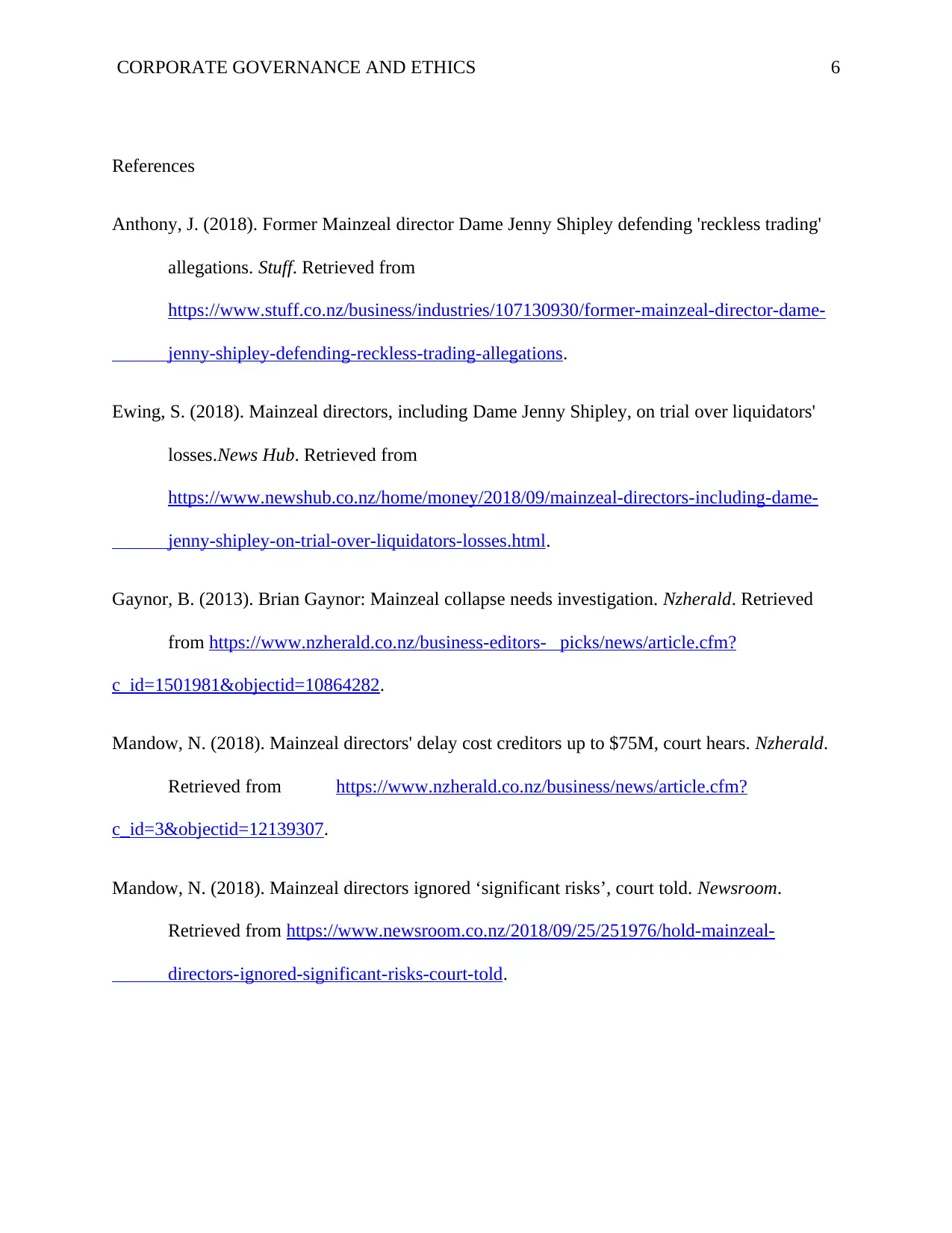
CORPORATE GOVERNANCE AND ETHICS 6
References
Anthony, J. (2018). Former Mainzeal director Dame Jenny Shipley defending 'reckless trading'
allegations. Stuff. Retrieved from
https://www.stuff.co.nz/business/industries/107130930/former-mainzeal-director-dame-
jenny-shipley-defending-reckless-trading-allegations.
Ewing, S. (2018). Mainzeal directors, including Dame Jenny Shipley, on trial over liquidators'
losses.News Hub. Retrieved from
https://www.newshub.co.nz/home/money/2018/09/mainzeal-directors-including-dame-
jenny-shipley-on-trial-over-liquidators-losses.html.
Gaynor, B. (2013). Brian Gaynor: Mainzeal collapse needs investigation. Nzherald. Retrieved
from https://www.nzherald.co.nz/business-editors- picks/news/article.cfm?
c_id=1501981&objectid=10864282.
Mandow, N. (2018). Mainzeal directors' delay cost creditors up to $75M, court hears. Nzherald.
Retrieved from https://www.nzherald.co.nz/business/news/article.cfm?
c_id=3&objectid=12139307.
Mandow, N. (2018). Mainzeal directors ignored ‘significant risks’, court told. Newsroom.
Retrieved from https://www.newsroom.co.nz/2018/09/25/251976/hold-mainzeal-
directors-ignored-significant-risks-court-told.
References
Anthony, J. (2018). Former Mainzeal director Dame Jenny Shipley defending 'reckless trading'
allegations. Stuff. Retrieved from
https://www.stuff.co.nz/business/industries/107130930/former-mainzeal-director-dame-
jenny-shipley-defending-reckless-trading-allegations.
Ewing, S. (2018). Mainzeal directors, including Dame Jenny Shipley, on trial over liquidators'
losses.News Hub. Retrieved from
https://www.newshub.co.nz/home/money/2018/09/mainzeal-directors-including-dame-
jenny-shipley-on-trial-over-liquidators-losses.html.
Gaynor, B. (2013). Brian Gaynor: Mainzeal collapse needs investigation. Nzherald. Retrieved
from https://www.nzherald.co.nz/business-editors- picks/news/article.cfm?
c_id=1501981&objectid=10864282.
Mandow, N. (2018). Mainzeal directors' delay cost creditors up to $75M, court hears. Nzherald.
Retrieved from https://www.nzherald.co.nz/business/news/article.cfm?
c_id=3&objectid=12139307.
Mandow, N. (2018). Mainzeal directors ignored ‘significant risks’, court told. Newsroom.
Retrieved from https://www.newsroom.co.nz/2018/09/25/251976/hold-mainzeal-
directors-ignored-significant-risks-court-told.
⊘ This is a preview!⊘
Do you want full access?
Subscribe today to unlock all pages.

Trusted by 1+ million students worldwide
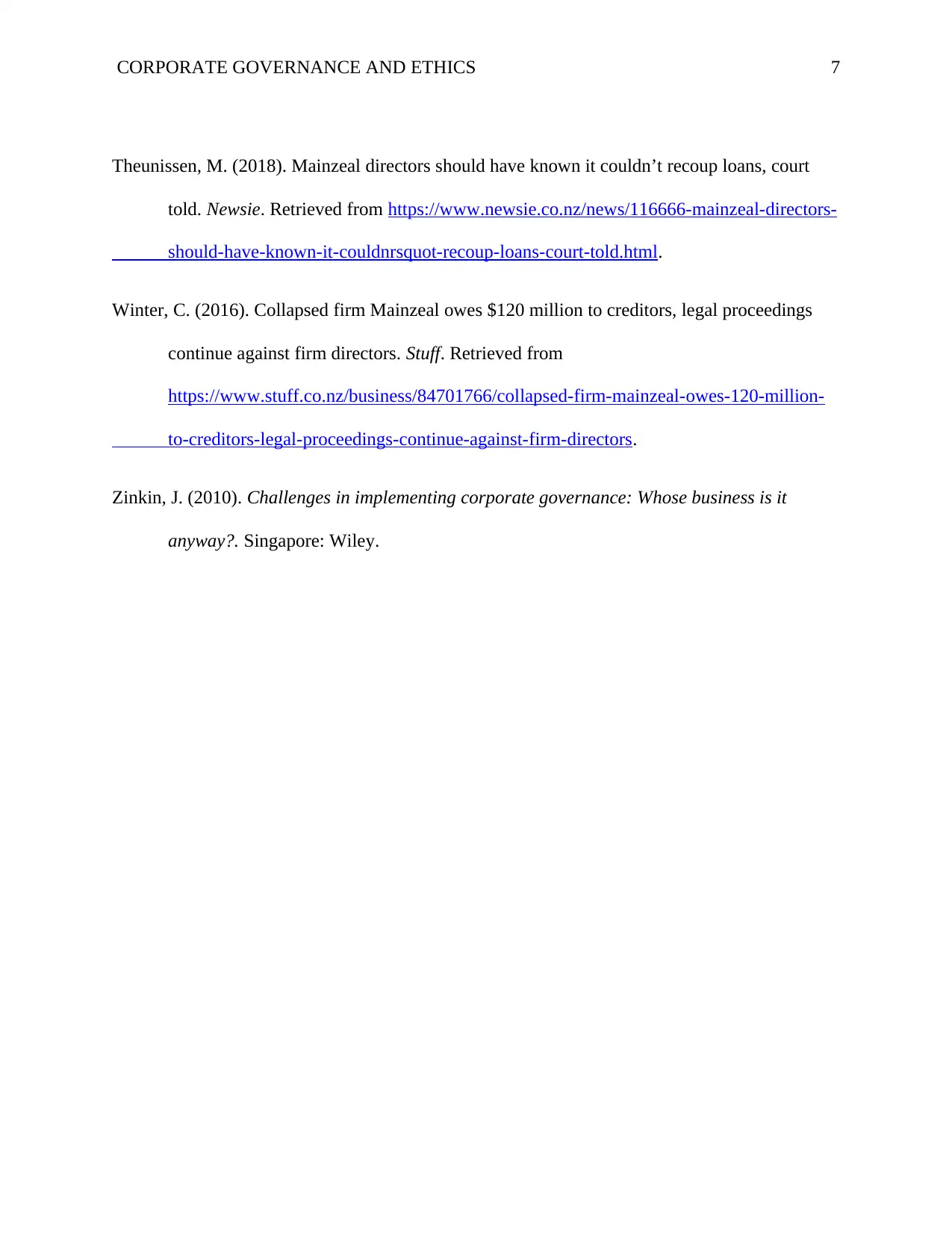
CORPORATE GOVERNANCE AND ETHICS 7
Theunissen, M. (2018). Mainzeal directors should have known it couldn’t recoup loans, court
told. Newsie. Retrieved from https://www.newsie.co.nz/news/116666-mainzeal-directors-
should-have-known-it-couldnrsquot-recoup-loans-court-told.html.
Winter, C. (2016). Collapsed firm Mainzeal owes $120 million to creditors, legal proceedings
continue against firm directors. Stuff. Retrieved from
https://www.stuff.co.nz/business/84701766/collapsed-firm-mainzeal-owes-120-million-
to-creditors-legal-proceedings-continue-against-firm-directors.
Zinkin, J. (2010). Challenges in implementing corporate governance: Whose business is it
anyway?. Singapore: Wiley.
Theunissen, M. (2018). Mainzeal directors should have known it couldn’t recoup loans, court
told. Newsie. Retrieved from https://www.newsie.co.nz/news/116666-mainzeal-directors-
should-have-known-it-couldnrsquot-recoup-loans-court-told.html.
Winter, C. (2016). Collapsed firm Mainzeal owes $120 million to creditors, legal proceedings
continue against firm directors. Stuff. Retrieved from
https://www.stuff.co.nz/business/84701766/collapsed-firm-mainzeal-owes-120-million-
to-creditors-legal-proceedings-continue-against-firm-directors.
Zinkin, J. (2010). Challenges in implementing corporate governance: Whose business is it
anyway?. Singapore: Wiley.
1 out of 7
Related Documents
Your All-in-One AI-Powered Toolkit for Academic Success.
+13062052269
info@desklib.com
Available 24*7 on WhatsApp / Email
![[object Object]](/_next/static/media/star-bottom.7253800d.svg)
Unlock your academic potential
Copyright © 2020–2025 A2Z Services. All Rights Reserved. Developed and managed by ZUCOL.





